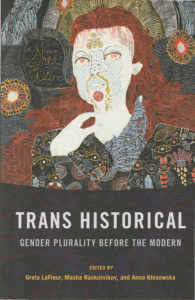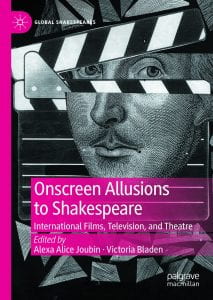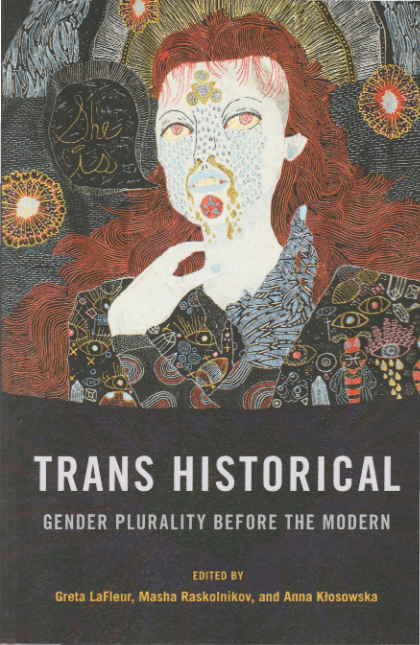 When AI goes to theater with humans, it changes the dynamics of the social space. This article examines a case of audiences using an AI app on their phones to translate a sign language performance. Whom does the screen interface serve, and how do artificial intelligence tools affect theatrical publics across both the playing space and the playgoing space? Screens are a site where cultural and performative meanings are generated and negotiated.
When AI goes to theater with humans, it changes the dynamics of the social space. This article examines a case of audiences using an AI app on their phones to translate a sign language performance. Whom does the screen interface serve, and how do artificial intelligence tools affect theatrical publics across both the playing space and the playgoing space? Screens are a site where cultural and performative meanings are generated and negotiated.
Category: Shakespeare on Screen
Open-Access Textbook: Screening Shakespeare
We are pleased to announce the publication of MIT Global Shakespeares co-founder Alexa Alice Joubin’s Screening Shakespeare, a new, open-access, online textbook with interactive learning modules. You can learn about key concepts of film and adaptation studies. The openly-licensed book is free to all. You can learn about film theory, mise-en-scène, cinematography, sound and music, and adaptation strategies in the context of global Shakespeare.

...continue reading "Open-Access Textbook: Screening Shakespeare"
Transgender Shakespeare and Why It Matters
 Many characters in Shakespeare's plays lend themselves to be interpreted as transgender. Even though Shakespeare’s plays were initially performed by all-male casts, they were designed to appeal to diverse audiences. Shakespeare’s plays, as readily available reference points, have been reimagined in performances that explore new gender roles. In particular, transgender performances tend to be billed, or perceived, as art with a cause, as a socially reparative act leading to the amelioration of personal and social circumstances. Reparative trans performances—works in which characters see their condition improve—carry substantial affective rewards by offering optimism and emotional gratification. The call for social justice may seem universal, but the exact elements requiring reparation are malleable. The reparative arcs diverge dramatically between different works. ...continue reading "Transgender Shakespeare and Why It Matters"
Many characters in Shakespeare's plays lend themselves to be interpreted as transgender. Even though Shakespeare’s plays were initially performed by all-male casts, they were designed to appeal to diverse audiences. Shakespeare’s plays, as readily available reference points, have been reimagined in performances that explore new gender roles. In particular, transgender performances tend to be billed, or perceived, as art with a cause, as a socially reparative act leading to the amelioration of personal and social circumstances. Reparative trans performances—works in which characters see their condition improve—carry substantial affective rewards by offering optimism and emotional gratification. The call for social justice may seem universal, but the exact elements requiring reparation are malleable. The reparative arcs diverge dramatically between different works. ...continue reading "Transgender Shakespeare and Why It Matters"
When Films Allude to Shakespeare …
 Shakespeare’s plays and motifs have been cited and appropriated on screen since motion pictures were invented in 1893. Allusions to Shakespeare haunt our contemporary culture in a myriad of ways, whether through brief references or sustained intertextual engagements. ...continue reading "When Films Allude to Shakespeare …"
Shakespeare’s plays and motifs have been cited and appropriated on screen since motion pictures were invented in 1893. Allusions to Shakespeare haunt our contemporary culture in a myriad of ways, whether through brief references or sustained intertextual engagements. ...continue reading "When Films Allude to Shakespeare …"
The Value of Global Shakespeare
Shakespeare and East Asia (2021) explores distinctive themes in post-1950s Asian-themed performances and adaptations of Shakespeare. In this Snapshot, former Fulbright Scholar Alexa Alice Joubin discusses the book and the importance of wider research into Global Shakespeares. ...continue reading "The Value of Global Shakespeare"
Five themes in Asian Shakespeare adaptations
Since the nineteenth century, stage and film directors have mounted hundreds of adaptations of Shakespeare drawn on East Asian motifs, and by the late twentieth century, Shakespeare had become one of the most frequently performed playwrights in East Asia. There are five striking themes surrounding cultural, racial, and gender dynamics. Gender roles in the play take on new meanings in translation, and familiar and unfamiliar accents expanded the characters’ racial identities.

In her new book, Shakespeare and East Asia, Alexa Alice Joubin explores five fascinating aspects about Asian adaptations of Shakespeare’s plays.
...continue reading "Five themes in Asian Shakespeare adaptations"
How Shakespeare Cures a Stuttering King
 The King's Speech (dir. Tom Hooper, 2010) and The Theory of Everything (dir. James Marsh, 2015) deal with figures that suffer from speech impairment. Lines from Shakespeare play an important role in scenes about speech therapy in The King's Speech.
The King's Speech (dir. Tom Hooper, 2010) and The Theory of Everything (dir. James Marsh, 2015) deal with figures that suffer from speech impairment. Lines from Shakespeare play an important role in scenes about speech therapy in The King's Speech.
Having worked with multiple therapists without any result, Bertie (Prince Albert, Duke of York, later King George VI), a stutterer, is reluctant to receive treatment from Lionel Logue. In their first session, Logue bets Bertie a shilling that he can in fact read without stammer right away, and he would record his speech as evidence. Logue puts headphones on Bertie and asks him to read Hamlet’s “to be or not to be” speech into a Silvertone Home Voice Recorder. ...continue reading "How Shakespeare Cures a Stuttering King"
Ethics of Performative Citations of Shakespeare
 Global Shakespeare can be studied through two interrelated concepts: performance as an act of citation and the ethics of citation. Appropriating the classics carries strong ethical implications. A crucial, ethical component of appropriation is one’s willingness to listen to and be subjected to the demands of others. These metaphorical citations create moments of self and mutual recognition. Seeing the others within is the first step toward seeing oneself in others’ eyes. The act of citation is founded upon the premise of one’s subjectivity, the subject who speaks, and the other’s voice that one is channeling, misrepresenting, or appropriating. ...continue reading "Ethics of Performative Citations of Shakespeare"
Global Shakespeare can be studied through two interrelated concepts: performance as an act of citation and the ethics of citation. Appropriating the classics carries strong ethical implications. A crucial, ethical component of appropriation is one’s willingness to listen to and be subjected to the demands of others. These metaphorical citations create moments of self and mutual recognition. Seeing the others within is the first step toward seeing oneself in others’ eyes. The act of citation is founded upon the premise of one’s subjectivity, the subject who speaks, and the other’s voice that one is channeling, misrepresenting, or appropriating. ...continue reading "Ethics of Performative Citations of Shakespeare"
Ophelia Unbound

How does Ophelia become “unbound” through supralinguistic structures of spectacle and music especially in a transgender performance? With case studies of three Hamlet films: Haider (India, 2004), The King and the Clown (South Korea, 2005), and Prince of the Himalayas (Tibet, 2006), this article examines theatrical and cinematic presentations of Ophelia's double bind as an icon and a victim. ...continue reading "Ophelia Unbound"
Ethics of Global Shakespeare

The dialogues between Shakespeare and his modern interlocutors are driven by ethical claims and the use of Shakespeare for political expediency. While artists and critics alike gravitate toward inspirational narratives, there is the risk of selling out on art’s impact on social justice. Advertising trends—or cultural paratexts around performances—are one area where artists’ ethical claims are sometimes countered by marketing shortcuts especially in relation to presentations of racial and gender diversity. In some cases, what appear to be multiethnic performances based on the casts turn out to be aesthetically incoherent, while in other cases queerness is framed as a defining feature when a production does not actively engage with gender diversity.
Here are highlights of my paper delivered at the Shakespeare Society of South Africa conference on "Shakespeare and Social Justice" in Fugard Theatre, Cape Town, May 16-18, 2019. ...continue reading "Ethics of Global Shakespeare"



